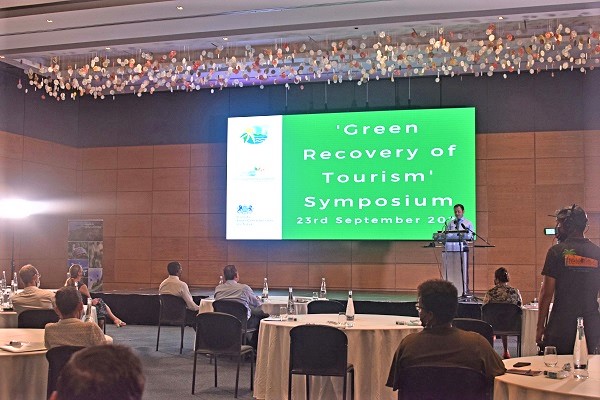Stakeholders from across the tourism sector and civil society gathered at Eden Bleu Hotel for the Green Recovery of Tourism Symposium on Thursday, September 23, to highlight the climate emergency and economic imperative of a green recovery of tourism.
This collaborative initiative between Seychelles’ Department of Tourism, the Ministry of Agriculture, Climate Change and Environment (MACCE), and the British High Commission, recognized tourism’s increasing vulnerabilities to the impacts of climate change. The symposium also recognized the sector’s susceptibility to longer-term projections of a decrease in long-haul travel from global travelers, due to the rising concern of carbon impacts of flights. With a considerable dependency on tourism, these issues represent a significant threat to the country’s economy.
Stakeholders from both the private and public sectors shared existing tools and best practices that are currently contributing towards climate adaptation and mitigation efforts within the tourism industry, to inspire more tourism businesses to engage in sustainable development and actively support conservation efforts. These include recognized sustainable certification labels, smart and responsible waste, water and energy management systems used in establishments, turning nature-based solutions to nature-based enterprises, and linking conservation to tourism digitization and marketing development.
In his statement at the symposium, Minister Radegonde mentioned that the events of the last two years have shown us how rapidly the world is changing and how vulnerable tourism is to external factors, especially in a small island state.

“We are also witnessing the rise of the more environmentally conscious traveler, who is increasingly expecting tourism destinations to offer more sustainable tourism options. For example, research shows that a growing number of people plan to fly less for their holidays in order to limit aircraft CO2 emissions and their carbon footprint. In addition, climate activists, have embarked on an aggressive “flight shaming” campaign around the world, particularly in Europe, discouraging long-haul flights. These movements appear to be gaining traction. And they do not bode well for our tourism industry. We find ourselves at a crossroads where we must choose wisely for a sustainable future and, in particular, for nature-based solutions that is a central preoccupation in the run up to COP 26,” said Minister Radegonde.
The symposium also served as an opportunity to shed light on Seychelles’ revised Nationally Determined Contribution (NDCs) – with a focus on national tourism commitments – to inform tourism stakeholders of the sector’s vital importance in achieving these goals over the next five to ten years.
GOT NEWS? click here
Google News, Bing News, Yahoo News, 200+ publications
A panel discussion on the topic of the “Green Recovery of Tourism; Goals, Opportunities and Needs” also took place in the afternoon. Panelists discussed the scope of job and entrepreneurial opportunities that a green tourism recovery could potentially bring to local communities; the need for a recovery that is inclusive in considering the needs and challenges all tourism stakeholders; how a green recovery contributes to Seychelles’ Blue Economy, and how nature-based tourism can receive funding for long-term conservation programs during moments of crises to the tourism industry, as demonstrated by the ongoing outbreak of the COVID-19 pandemic globally.
Participants also reflected on the needs required to achieve a Green Recovery of Tourism – and climate adaptation and mitigation targets – as part of the production of an outcome document. This short document will reflect the purpose of the symposium, and briefly summarize the discussions and reflections made during the event. The document also features a short NDC-based and tourism-focused pledge – to be used as a reference point for future deliberations – which participants will be invited to sign.
Importantly, there was overwhelming consensus amongst participants that Seychelles was well placed to adapt to changing consumer behavior in international travel and be a world leader in sustainable tourism – arguably more than any other destination. The Green Recovery Tourism in Seychelles, as proposed by this Symposium, would therefore turn a significant economic threat, into a long term economic opportunity.
MEDIA CONTACT: Tourism Seychelles, [email protected]







